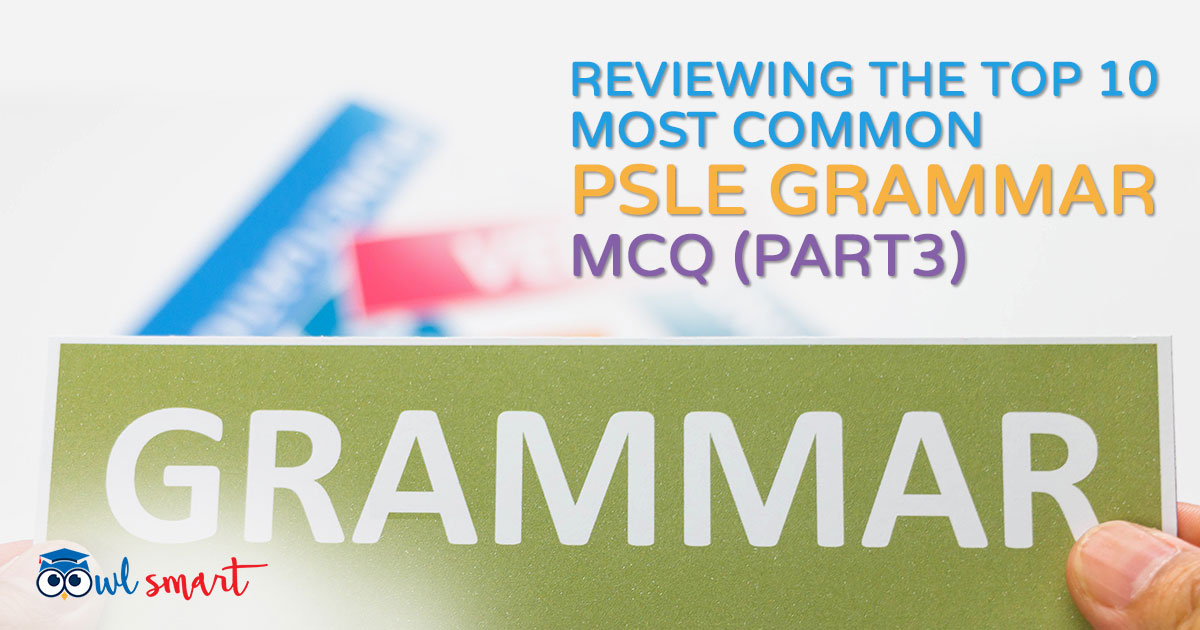
This is the final article that will look at the Grammar MCQs that appeared in PSLE 2016 and 2017. We will share these questions with you and the explanations for the answers. The main purpose of this article is to get the student to be familiar with the structure and requirements of these common questions.

Question 7 – Preposition
The scientist is well-known his expertise in designing and building robots. (PSLE 2016)
- about
- from
- for
- by
Answer: (3) for
If you don't have a good grasp the skills taught, you won't be able to do the job well. (PSLE 2017)
- in
- of
- on
- over
Answer: (2) of
Explanation
- The preposition 'for' means representing something. The preposition 'as' is also commonly used with 'well-known'. E.g. Obesity is well-known as a risk factor for heart failure.
- The preposition 'of' means possessing something. Other collocative phrases involving 'of' include 'good control of' and 'good knowledge of'.
Question 8 – Tenses in Direct Speech
"Won't Dad be pleased when he that we were both selected to act in the school play?" Nurul asked her brother. (PSLE 2016)
- hears
- heard
- has heard
- had heard
Answer: (1) hears
Sheila better start rehearsing for her role soon as the play is in a month's time,” said Timmy. (PSLE 2015)
- has
- had
- have
- having
Answer: (2) had
Explanation
- We use the present tense as Nurul's dad has not told her father about the good news yet.
- This question uses the phrase "Nurul asked..." as a distractor. Students might erroneously think they have to use 'heard' in order to have grammatical agreement.
- We use 'had better' to refer to the future. It is usually used to talk about actions people should take in a specific situation.
e.g. It's 6pm. I had better go now before the traffic gets too bad.- A common error is to use 'had better' to talk about obligations or requirements.
e.g. You must pass the driving test in order to drive a car on the road.
NotYou had better pass the driving test in order to drive a car on the road.
- A common error is to use 'had better' to talk about obligations or requirements.
Question 9 – Modal Verb - Possibility
"Do look for me you need any help," the librarian told the pupils. (PSLE 2015)
- will
- shall
- would
- should
Answer: (4) should
" you have offered your help earlier? It would have saved me a lot of trouble," Mum grumbled. (PSLE 2017)
- Can't
- Won't
- Couldn't
- Wouldn't
Answer: (2) had
Explanation
- We can use Should you as an alternative to If you should in these situations by changing the order of the subject and the verb. Both Should you and if you should are both formal in tone and express possibility.
e.g. “If you should need any help, do look for me,” the librarian told the pupils. - We use Could have to mean that to show that something is possible now or was possible at some time in the past.
e.g. I could have gone home directly this afternoon but I went to the mall instead.
Question 10 – Choice of tense with noun/noun phrase
The voice in the song recordings believed to be that of Superstar Paul, but it has since been proven wrong. (PSLE 2017)
- is
- are
- was
- were
Answer: (3) was
Whether the children attend their swimming classes or not on the weather. (PSLE 2015)
- depend
- depends
- depended
- depending
Answer: (2) depends
Explanation
- The noun 'the voice' is singular. That eliminates 'are' and 'were'. The second part of the sentence indicates that the event described in the first part of the sentence has occurred earlier. That eliminates the use of the present tense and the option 'is'.
- There is only one noun phrase present. The noun phrase is 'the children attend their swimming classes'. That eliminates 'depend'. The sentence is in the present tense. Hence, we use the present, singular form of the verb.
Conclusion
This concludes the last of the three articles on Grammar MCQs that have appeared in the last two to three years. Many variants of these questions are available in the OwlSmart database with detailed explanations which allow students to fully understand the answers. Sign up for free today.
We hope you do well in this section.
About the Author
Teacher Chin has more than a decade of experience in teaching English from Primary Two to Primary Six in local primary schools. He is presently, in his free time, having immense enjoyment experimenting with the Nimzo-Indian Defence in chess and trying out the Apacs Lethal 9 in badminton doubles.



